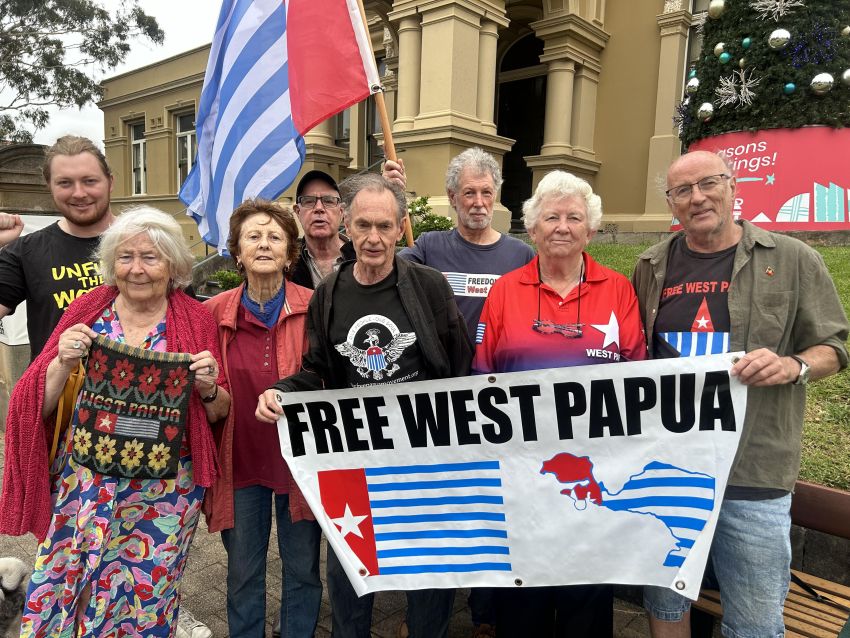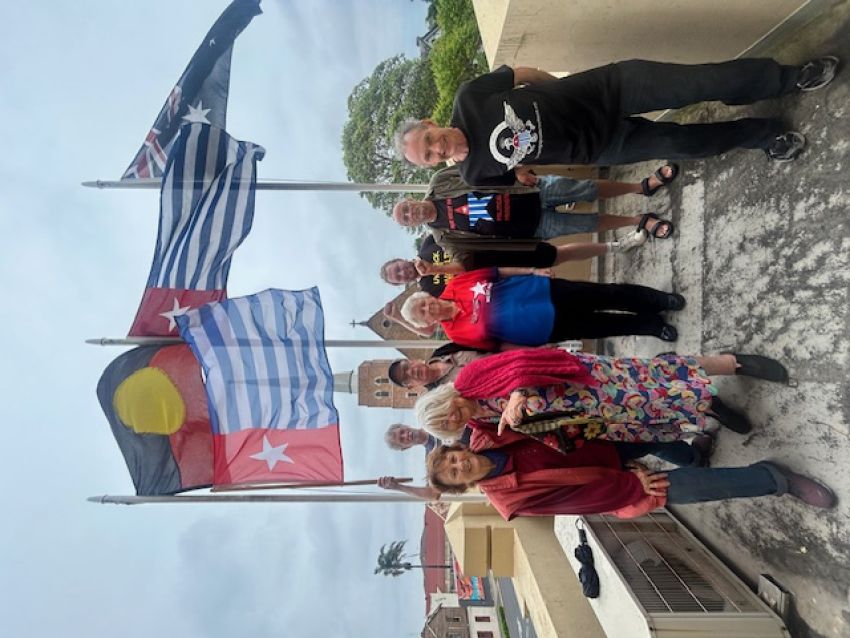
The Australia West Papua Association (AWPA) and supporters raised the West Papua flag at Leichhardt Town Hall on November 29, to show their solidarity with West Papuan’s struggle for self-determination.
This year’s National Flag day, on December 1, marks the 63rd anniversary of the first official flying of the Morning Star flag, in 1961, in the then-Dutch colony of Netherlands New Guinea.
“The Dutch were prepared to give West Papuans their freedom. It is one of the great tragedies that their freedom was cruelly crushed, when West Papua was handed to Indonesia in 1963,” AWPA’s Joe Collins said. “It was a betrayal of a whole people.”
Sixty-three years later, while the West Papuan people maintain their right to self-determination, human rights abuses continue and the security situation in the territory continues to deteriorate.

“There are ongoing clashes between the security forces and the West Papua National Liberation Army, with casualties on both sides. West Papuans continue to be arrested, intimated and killed by the security forces,” Collins said.
He said that military operations over the past few years that burned villagers’ houses have caused large numbers of internal refugees.
Human Rights Monitor said in its September update that more than 79,867 people in West Papua remain internally displaced.
“Many of these people live without government aid because of the ongoing conflict between the West Papua National Liberation Army and Indonesian security forces, which makes the delivery of aid very difficult.”
Collins said the election of President Prabowo Subianto who, as a former general under Suharto’s regime, presided over Indonesia’s human rights abuses in East Timor, is a major concern for West Papuans.
Collins said just days after Prabowo’s inauguration, he announced plans to resume Indonesia’s transmigration program in eastern Indonesia, particularly in Papua.
Prabowo said it would enhance unity and provide locals with welfare. Collins said transmigration means West Papuans are in danger of becoming a minority in their own land.
“Protests against the reintroduction of the transmigration program are happening in West Papua.” Collins said that “we can’t expect to see a change in the Indonesian security force approach”, given that Prabowo is a former general.
Indonesia’s Armed Forces Commander General Agus Subiyanto established five new infantry battalions in October, which will be deployed in “conflict-prone” areas of Papua. Their mission will be to forcibly support the government’s efforts in the eastern region of Indonesia.
“The military will probably be used in forcible land acquisitions for its large planned food estates, such as sugar cane, palm oil and rice farms. This will also lead to the destruction of tropical rainforests, biodiversity and customary land,” Collins said.
Two million hectares of forests, wetlands and grasslands in Merauke district will be razed to make way for a cluster of giant sugarcane plantations, part of the Indonesian government’s efforts to boost domestic sugar production, Collins said.
There is also the danger of conflict between the migrants, backed by the military, and local Papuan landowners.
Meanwhile, Australia continues to increase defence ties with the Indonesian military. Collins said Australia had given “no thought” to Indonesia’s crackdowns on peaceful West Papua demonstrators or that activists are “regularly arrested and intimidated”.
“The West Papuan people are calling on the United Nations High Commissioner for Human Rights to visit West Papua to investigate the human rights situation in the territory. Australia should urge Jakarta to allow such a visit to take place. It would be small step that would benefit the West Papuan people,” Collins said.